Vocabulary, much more than grammar, is the key to effective communication in Arabic. You need words to speak; you need words to listen and understand.
Knowing grammar inside and out won’t save you if you don’t have the right word to plug into the structure. You can walk into a shop armed with grammatical structures such as “I would like some __.” or “Do you have any __?”, but if you don’t know the word for the thing you want, you may very well leave the shop empty-handed. On the other hand, if you walk into that same shop and simply say “sugar”, you’re almost certain to get what went there for.
And without an extensive repertoire of vocabulary, you will understand very little of what others are talking about. Spoken Arabic, to your foreign ears, will remain little more than gibberish. But once you can understand the majority of what you hear, something magical happens. The input becomes manageable–you will be able to use contextual clues from what you do understand to guess the meaning of new words and start to make rapid progress in Arabic.
It is therefore very important to build up a large store of words as soon as possible. The Egyptian, Levantine, Moroccan, and Tunisian Colloquial Arabic Vocabulary books are an enormously effective means to this end. By presenting practical words and phrases categorized by topic and arranged with a logical flow, mental connections that assist in vocabulary retention are fostered. The page layout in parallel columns of English translation, phonemic transcription, and Arabic script provides a variety of ways to study the vocabulary by allowing you to cover columns and test yourself.
The accompanying MP3s, free to download from each book’s product page make up an invaluable part of the learning process, allowing you to hear and mimic native speakers’ pronunciation, pitch, intonation, and rhythm. Anki digital flashcards are available separately and provide even more powerful tools for rapid vocabulary acquisition.
Although extremely important, vocabulary still only makes up one aspect of learning a language. The Colloquial Arabic Vocabulary series is the ideal supplementary tool to reinforce vocabulary acquisition. However, it is not meant to be a stand-alone course. It is expected that you have followed, are following, or plan to follow, a language course, as well. Alternatively, you may have studied another dialect of Arabic, or Modern Standard Arabic (MSA), and are curious to learn more and tune your ears to the idiosyncrasies of another beautiful dialect.
Each book in the series is made up of 57 thematic sections, each dedicated to a different topic and numbered to facilitate references from the index and the MP3s.
You may study the sections and individual vocabulary items in any order, or you may work through the book systematically. It is encouraged that you mark up and highlight the book as you use it. Make it your own. There is also a Notebook after the last section where you can add in more colloquial Arabic words you have learned from other sources.
Many words could logically belong to more than one topic. While some words do appear in more than one section, to avoid superfluous repetition of words, most appear only once. To your surprise, you might not be able to find common animals such as cow and horse in the section “Animals”, for instance. This is because farm animals appear in the section “Agriculture” instead. This might not be entirely intuitive, so to solve this, an index appears at the back of the book with English words arranged alphabetically alongside a reference to the number of the section or sections in which a word appears.
The following is a usage guide for the Egyptian Colloquial Arabic Vocabulary book. Similar guides appear in the other versions, as well.
- For nouns and adjectives having an irregular plural form, the plural appears in parentheses.
- If a noun is listed in its dual or plural ([pl.]) form, this is indicated.
- A noun ending in ـة is feminine, and a noun not ending in ـة is masculine. The gender is marked [m.] and [f.] for nouns which do not follow this rule.
- All countries, except those marked [m.] and all cities are feminine. Keep this in mind as countries and cities are not marked [f.].
- Only the masculine version of nouns denoting humans is listed when the feminine equivalent can be formed by adding ـة. For example, مدرس mudarris is a male teacher. A female teacher would be مدرسة
- For the sake of consistency and simplicity, the masculine singular form is used in expressions. You will need to use your knowledge of Arabic grammar to produce the feminine or plural equivalents.
- Some nouns are classified as collective nouns. An explanation of the usage of collective nouns appears on page 59.
- Some adjectives are invariable and are marked [invar.]. These do not have a feminine or plural form.
- Each verb appears in its base form (its most basic form without any prefixes or suffixes), which is the masculine singular past tense, literally “he did”; however, the English translation appears in its standard citation form: “to do”. In order to use a verb in a sentence, it must be conjugated.
- Every verb is followed by small square brackets with a reference to its corresponding table in the book Egyptian Colloquial Arabic Verbs, which presents conjugation tables to model all the possible conjugated forms of any verb in ECA.
- The Arabic script reflects common spelling conventions used by Egyptians, but with a couple of notable exceptions to facilitate reading: ـة and ـي appear with dots, whereas most Egyptians leave off the dots (ـه and ـى).
- A few words, which are vulgar or taboo, do not appear on the MP3s because of their sensitive nature. These are marked with an asterisk (*).
This article was adapted from the Introduction and How to Use This Book sections of the books in the Colloquial Arabic Vocabulary series.

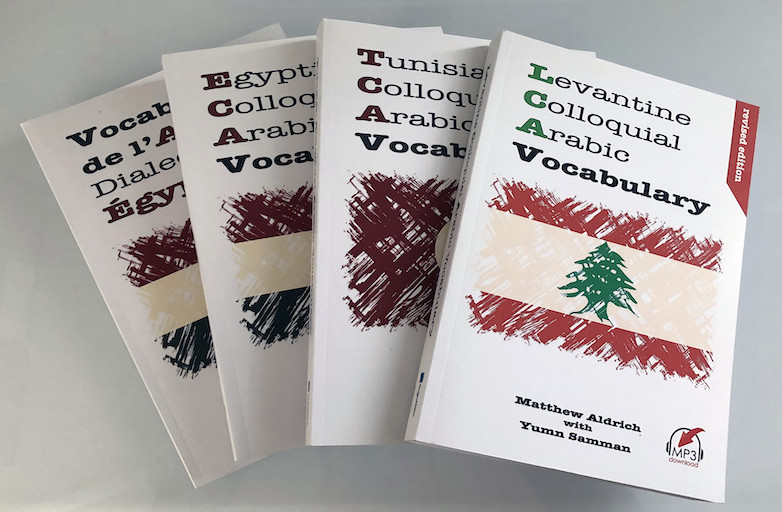
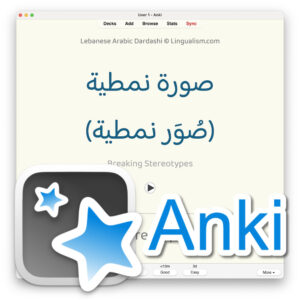
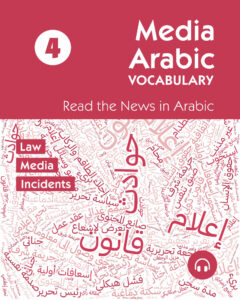
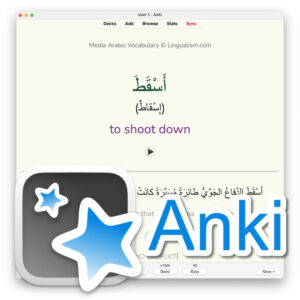
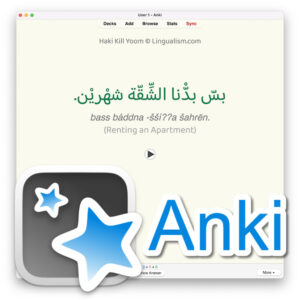
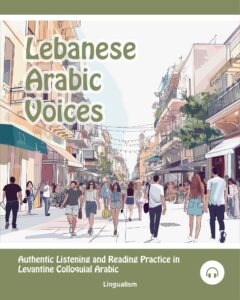

You guys should create the following to add in your Lingualism library : Shwayya ‘An Haali: Listening ,Reading and Expressing Yourself in Palestinian ?? Arabic books ? 1& 2,Colloquial Syrian ?? Arabic Vocabulary & Syrian ?? Arabic Verbs: Conjugation Verb Tables and Grammer
Steven ستيفن
Thank u
Thank u need the proper base form alphabet stans [ book ] to learn all looking! / it’s not easy.thanks bye”.
Our books are for learners who have already been learning Arabic; we do not teach the basic alphabet in each book, but many have pronunciation guides. You can also find pronunciation guides and guides to our phonemic writing system on our website. Article: MSA Phonemic Transcription.